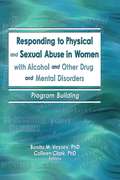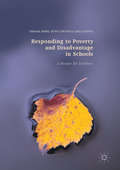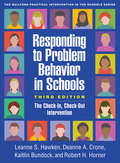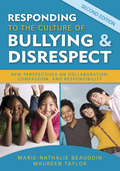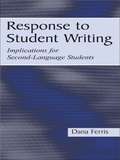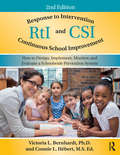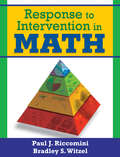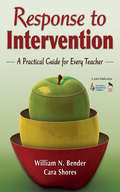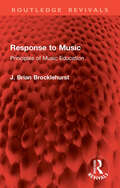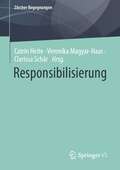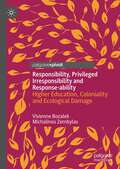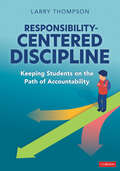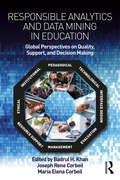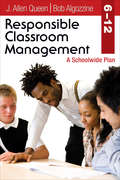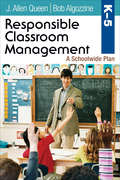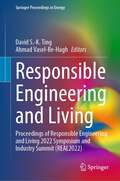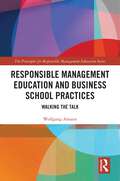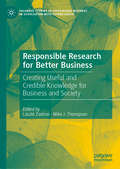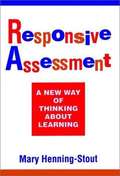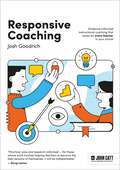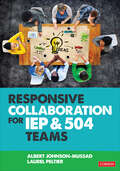- Table View
- List View
Responding to Physical and Sexual Abuse in Women with Alcohol and Other Drug and Mental Disorders: Program Building
by Bonita Veysey Colleen ClarkLearn from the experiences of these program sites to develop better services for women with co-occurring disorders and histories of violenceThis book explores the efforts of the Women, Co-Occurring Disorders and Violence Study to address the significant lack of appropriate services for women trauma survivors with co-occurring mental health and substance use disorders. Experts describe the services integration programs of nine participating sites that address the multiple needs of these women. In this guide, you will find useful strategies for integrating services that are responsive to the strengths and needs of the individual as well as the community.This vital resource examines how-over a period of five years-sites designed, implemented, and evaluated their interventions. You will learn how sites developed their strategies for integrating services at both the clinical/individual level and at the services or systems level. The book also shows how trauma-informed, gender-specific, culturally competent care fosters treatment that is sensitive to related issues such as children and parenting, interpreting culture cues, and socioeconomic difficulties. In Responding to Physical and Sexual Abuse in Women with Alcohol and Other Drug and Mental Disorders, you will learn about the details of nine different programs, including: Franklin County Women&’s Research Project-a collaborative project for rural women, designed and operated by local consumer/survivor/recovering women (CSRs) The Triad Women&’s Project-a semi-rural comprehensive system of care to respond to the needs of women and children The Women Embracing Life and Living (WELL) Project-interventions include trauma, parenting, systems integration and mutual help groups withIntegrated Care Facilitators providing resource coordination and advocacyservices PROTOTYPES, Centers for Innovation in Health, Mental Health, and Social Services-the three levels of integration the Systems Change Center implemented the Boston Health Commission-an integrated model of trauma-informed services culturally and linguistically appropriate for its service population of primarily poor Latina and African American women Palladia&’s Portal Project-a comprehensive trauma-informed intervention designed to put trauma and safety first to assist women remaining in treatment Arapahoe House&’s New Directions for Families-a family-oriented intervention for women and their dependent children Allies-comprehensive, integrated services for women as well as intervention for their children, ages 5-10The District of Columbia Trauma Collaboration Study (DCTCS)-a two-phase project addressing the needs of dually diagnosed women trauma survivors Responding to Physical and Sexual Abuse in Women with Alcohol and Other Drug and Mental Disorders provides you with first-hand accounts of the process by which programs and service systems were transformed. As challenges were met and strategy was adapted to "real world" situations, the sites discussed in this text found new and improved methods for helping this unique group of women. The book offers tips, solutions, and possibilities to mental health professionals, substance abuse professionals, and domestic violence professionals, and even patients and/or clients searching for support.
Responding to Poverty and Disadvantage in Schools
by Carlo Raffo Tamara Bibby Ruth LuptonThis book explores a range of challenges teachers face in dealing with situations of disadvantage, and explores different ways of thinking about these situations. Starting with a variety of incidents written by teachers in schools in disadvantaged settings, the book provides a range of ways of thinking about these - some more psychological, others more sociological - and chapters develop conversations between teachers and academics. These 'conversations' will help teachers reflect more deeply on the contexts in which they work, on what disadvantage means, and how disadvantage manifests in practice. It will also help teachers reflect upon the nature of their work; what it means to be a good and effective teacher; and the particular skills, approaches, relationships and competencies that may need to be developed in differing settings of educational disadvantage. The book explores the tensions between different ways of thinking about education and disadvantage; it will make compelling reading for students and teachers of education, education policy makers, and practising schoolteachers.
Responding to Problem Behavior in Schools, Third Edition: The Check-In, Check-Out Intervention (The Guilford Practical Intervention in the Schools Series)
by Leanne S. Hawken Robert H. Horner Deanne A. Crone Kaitlin BundockNow revised and expanded with the latest research and adaptations for additional target behaviors, this is the gold-standard guide to Check-In, Check-Out (CICO), the most widely implemented Tier 2 behavior intervention. CICO is designed for the approximately 10–15% of students who fail to meet schoolwide behavioral expectations but who do not require intensive, individualized supports. In a large-size format for easy photocopying, the book includes step-by-step procedures and reproducible tools for planning and implementation. At the companion website, purchasers can download and print the reproducible tools and can access online-only training materials, sample daily progress reports, and an Excel database for managing daily data. (Second edition subtitle: The Behavior Education Program.) New to This Edition *Chapters on CICO in alternative educational settings and for students with internalizing behavior problems. *Content on using CICO for attendance issues, academic and organizational skills, and recess behavior problems. *Chapter on layering additional targeted interventions onto CICO. *Chapter with specific recommendations for training and coaching school teams. *Expanded chapters on frequently asked questions, implementation in high school, and culturally responsive practices. *Supplemental online-only training and data management tools. *Updated throughout with current data and evidence-based procedures. See also Dr. Hawken's training DVD, Check-In, Check-Out, Second Edition: A Tier 2 Intervention for Students at Risk. Also available: the authors' work on intensive interventions for severe problem behavior, Building Positive Behavior Support Systems in Schools, Second Edition: Functional Behavioral Assessment. This book is in The Guilford Practical Intervention in the Schools Series, edited by Sandra M. Chafouleas.
Responding to the Culture of Bullying and Disrespect: New Perspectives on Collaboration, Compassion, and Responsibility (2nd Edition)
by Marie-Nathalie Beaudoin Ms Maureen E. TaylorCreate a safe learning environment so students can achieve! This updated edition of Breaking the Culture of Bullying and Disrespect offers educators a comprehensive, therapeutic approach to reducing disrespectful behaviors. Readers will discover how to establish a positive and caring environment that discourages misbehavior while encouraging greater respect, tolerance, and responsibility. This new edition features: Updated research, including real-life examples of successful experiences; Additional case studies and a list of problem-solving questions; A new chapter on brain research and how children learn; An all-new section focusing on prevention methods.
Response To Student Writing: Implications for Second Language Students
by Dana R. FerrisThis volume synthesizes and critically analyzes the literature on response to the writing of second language students, and discusses the implications of the research for teaching practice in the areas of written and oral teacher commentary on student writing, error correction, and facilitation of peer response. The book features numerous examples of student texts and teacher commentary, as well as figures and appendices that summarize research findings and present sample lessons and other teaching materials. It is thus simultaneously comprehensive in its approach to the existing research and highly practical in showing current and future teachers how this material applies to their everyday endeavors of responding to student writing and teaching composition classes. Response to student writing--whether it takes the form of teachers' written feedback on content, error correction, teacher-student conferences, or peer response--is an extremely important component of teaching second language writing. Probably no single activity takes more teacher time and energy. Response to Student Writing is a valuable theoretical and practical resource for those involved in this crucial work, including L2 composition researchers, in-service and preservice teachers of ESOL/EFL writers, and teacher educators preparing graduate students for the teaching of writing.
Response to Intervention and Continuous School Improvement: How to Design, Implement, Monitor, and Evaluate a Schoolwide Prevention System
by Victoria L. Bernhardt Connie L. HébertExperts Bernhardt and Hébert's latest book demonstrates strategies to ensure your entire staff works together to design, implement, monitor, and evaluate a schoolwide prevention system with integrity and fidelity. Each step in this important resource is designed to help administrators, teachers, and other educators improve the learning of every student by implementing Response to Intervention (RtI) as part of a continuous school improvement process. This second edition spotlights the "Five Stages of RtI Implementation" and is complemented by the robust online RtI Implementation Guide, which includes more than 30 downloadable templates, examples, and other files to help schools start their journey of establishing a successful system. By applying the authors' insightful guidance in Response to Intervention (RtI) and Continuous School Improvement (CSI), you'll be able to redesign your general and special education programs to put your school on a path toward improvement!
Response to Intervention in Math
by Bradley S. Witzel Paul J. RiccominiBoost academic achievement for all students in your mathematics classroom! This timely resource leads the way in applying RTI to mathematics instruction. The authors describe how the three tiers can be implemented in specific math areas and illustrate RTI procedures through case studies. Aligned with the NMAP final report and IES practice guide, this book includes: Intervention strategies for number sense, fractions, problem solving, and more Procedures for teaching math using systematic and explicit instruction for assessment, instructional planning, and evaluation Essential components to consider when designing and implementing RTI in mathematics
Response to Intervention: A Practical Guide for Every Teacher
by William N. Bender Cara F. ShoresDiscover a resource that shows teachers how to implement RTI in the classroom! This practical guide helps educators understand the tiers of the Response to Intervention (RTI) process, as well as how to implement interventions and utilize the results to modify existing instruction for students in the classroom. With vignettes, examples, and reproducible forms based on the problem-solving and standards-based approaches to RTI, this accessible handbook gives teachers the tools to: Document the existence or nonexistence of a learning disability Monitor individual student progress Plan specific follow-up interventions based on a learner's needs Implement strategies to support students' success
Response to Music: Principles of Music Education (Routledge Revivals)
by J. Brian BrocklehurstFirst published in 1971, Response to Music deals with the role of music in education, the formulation of aims and objectives, and the relationship between values, aims, and teaching methods. The author examines the relationship of aims in music education to the requirements of our modern technological society and discusses the adaptability of various foreign systems to music education.Particular reference is made to those aims concerned with the development of musical responsiveness: such determining factors as musical ability, aesthetic sensitivity, listening reaction patterns, and attitude are considered and their educational implications discussed. Separate chapters are devoted to the development of musical understanding and skills.
Responsibilisierung (Zürcher Begegnungen)
by Clarissa Schär Veronika Magyar-Haas Catrin HeiteDer Band prüft den Begriff Responsibilisierung aus unterschiedlichen disziplinären Perspektiven auf seine Aktualität, sein analytisches Gewicht und seine theoretischen Bedeutungen und bringt so die Erziehungswissenschaft mit der Soziologie, der Philosophie oder der Geschichtswissenschaft ins Gespräch. Es wird sowohl danach gefragt, welche tragfähigen theoretischen, analytischen und politischen Perspektiven mit einer positiven Bezugnahme auf die Begriffe ‹Verantwortung› und ‹Responsibilisierung› verbunden sind, als auch danach, welche Kritiken angemessen erscheinen.
Responsibility, privileged irresponsibility and response-ability: Higher Education, Coloniality and Ecological Damage (Palgrave Critical University Studies)
by Michalinos Zembylas Vivienne BozalekThis book uses the overlapping approaches of political care ethics and feminist posthumanism as a lens to focus on the notions of privileged irresponsibility, responsibility and response-ability within the context of higher education and as it pertains to the issues of colonialism/decolonisation, pandemics and the climate crisis. The book will appeal to scholars in the field of higher education as well as to those in several other fields, such as ecology, gender studies, sociology, philosophy, and political science.
Responsibility-Centered Discipline: Keeping Students on the Path of Accountability
by Larry L ThompsonFoster responsibility, empathy, and self-regulation in every learner. Hundreds of schools across North America are embracing Larry Thompson’s Responsibility-Centered Discipline (RCD) – a groundbreaking approach that supports students in developing intrinsic motivation and growing as conscientious and active members of their school communities. Emphasizing responsibility, empathy, and self-regulation, RCD offers a transformative whole-school method to create a thriving school climate and responsible students. In this clear and explicit guide, Thompson presents an overview of RCD and its foundations, the six exits students commonly use to avoid responsibility, a structured conversation to return students to a path of responsibility, and a process educators can implement to create a solutions space. Additional features include: Success stories from the field Research highlights Coaching conversations Questions to help readers apply the information to their own contexts A must-read for teachers and education leaders seeking to reimagine discipline for a healthier and more supportive educational environment, Responsibility-Centered Discipline provides research-based actions to build skills such as responsibility, perseverance, empathy, and self-regulation in every learner from preK through high school.
Responsibility-Centered Discipline: Keeping Students on the Path of Accountability
by Larry L ThompsonFoster responsibility, empathy, and self-regulation in every learner. Hundreds of schools across North America are embracing Larry Thompson’s Responsibility-Centered Discipline (RCD) – a groundbreaking approach that supports students in developing intrinsic motivation and growing as conscientious and active members of their school communities. Emphasizing responsibility, empathy, and self-regulation, RCD offers a transformative whole-school method to create a thriving school climate and responsible students. In this clear and explicit guide, Thompson presents an overview of RCD and its foundations, the six exits students commonly use to avoid responsibility, a structured conversation to return students to a path of responsibility, and a process educators can implement to create a solutions space. Additional features include: Success stories from the field Research highlights Coaching conversations Questions to help readers apply the information to their own contexts A must-read for teachers and education leaders seeking to reimagine discipline for a healthier and more supportive educational environment, Responsibility-Centered Discipline provides research-based actions to build skills such as responsibility, perseverance, empathy, and self-regulation in every learner from preK through high school.
Responsible Analytics and Data Mining in Education: Global Perspectives on Quality, Support, and Decision Making
by Badrul H. Khan Joseph Rene Corbeil Maria Elena CorbeilRapid advancements in our ability to collect, process, and analyze massive amounts of data along with the widespread use of online and blended learning platforms have enabled educators at all levels to gain new insights into how people learn. Responsible Analytics and Data Mining in Education addresses the thoughtful and purposeful navigation, evaluation, and implementation of these emerging forms of educational data analysis. Chapter authors from around the world explore how data analytics can be used to improve course and program quality; how the data and its interpretations may inadvertently impact students, faculty, and institutions; the quality and reliability of data, as well as the accuracy of data-based decisions; ethical implications surrounding the collection, distribution, and use of student-generated data; and more. This volume unpacks and explores this complex issue through a systematic framework whose dimensions address the issues that must be considered before implementation of a new initiative or program.
Responsible Classroom Management, Grades 6–12: A Schoolwide Plan
by Bob Algozzine J. Allen QueenThis book provides everything needed to implement a team-based approach to schoolwide behavior management and reduce discipline problems in Grades 6–12.
Responsible Classroom Management, Grades K–5: A Schoolwide Plan
by Bob Algozzine J. Allen QueenWritten for K–5 principals and teachers, this all-inclusive resource introduces a nationally tested discipline plan that emphasizes a team approach to managing student behavior.
Responsible Engineering and Living: Proceedings of Responsible Engineering and Living 2022 Symposium and Industry Summit (REAL2022) (Springer Proceedings in Energy)
by David S.-K. Ting Ahmad Vasel-Be-HaghThis book includes the proceedings of the Responsible Engineering and Living 2022 Symposium and Industry Summit. Molière holds each of us accountable when he asserted that, “It is not only for what we do that we are held responsible, but also for what we do not do.” Responsible Engineering and Living 2022 (REAL2022) strived to inspire every individual to practise and foster responsible engineering and living. Its proceedings brings all stakeholders, enthusiasts and experts from academia, industry, policy arenas, and general public, together to discuss challenges, sharpen existing solutions, and formulate novel means to advance responsible engineering and living. This symposium disseminates recent progress and promote collaborations to maximize opportunities for innovative solutions. Topics of interest include resource and energy conservation, waste reduction, nature-friendly engineering and architecture, and sustainable vibrant living.
Responsible Management Education and Business School Practices: Walking the Talk (The Principles for Responsible Management Education Series)
by Wolfgang AmannBeyond researching and teaching responsible management, business schools should aspire to walk the talk. They ought to become role models and responsible organisations themselves. Focussing on the original UK and Ireland institutions who committed to this initiative formally by becoming signatories, this book considers how this role-modelling behaviour has been applied.Based on a number of personal interviews with PRME initiative leads, this book provides a two-dimensional framework based on structure and motivation as critical levers for progress in responsible management organisational practice. It offers unique recommendations on how to better frame and improve organisational practices in PRME member schools. Specifically, this book: 1. sheds light on how to bring PRME to life beyond teaching and research practices; 2. provides recommendations on how dean and PRME initiative leads in signatory institutions can better understand their current organisational practices and prepare improvements over time; and 3. energises and catalyses research on best organisational practices based on a clear research agenda.This book is relevant to all stakeholders of modern management education, in particular, business school deans, university presidents, programme directors, PRME leads and non-academic leaders in business schools, such as COOs or managing directors.
Responsible Management Education: The PRME Global Movement (The Principles for Responsible Management Education Series)
by Principles for Responsible Management EducationThe ebook will be Open Access and made available on publication. Written by many of the key influencers at the Principles for Responsible Management Education (PRME), the book focuses on advancing sustainable development into education, research and partnerships at higher education institutions and, specifically, at business schools, with the purpose of educating responsible leaders for today and tomorrow. The book serves as a concrete source of inspiration for universities and other stakeholders in higher education on structures, processes and content for how to advance responsible management education and sustainable development. It articulates the importance of key themes connected with climate change, gender equality, anti-corruption, business for peace, anti-poverty and other topics that are related to the Sustainable Development Goals (SDGs). The book emphasizes the significance of local–global interaction, drawing on local action at management schools in combination with global knowledge exchange across the PRME community. In addition, the book clearly demonstrates the background, key milestones and successful achievements of PRME as a global movement by management schools in collaboration with a broader community of higher education professionals. It exemplifies action in various local geographies in PRME Chapters, PRME Working Groups and the PRME Champions work to advance responsible management education. The authors of the book are all globally experienced deans, professors, educators, executives and students with a global outlook, who are united to advance responsible management education locally and globally. The book will be invaluable reading for university leaders, educators, business school deans and students wanting to understand and embed responsible management education approaches across their institutions and curricula.
Responsible Research for Better Business: Creating Useful and Credible Knowledge for Business and Society (Palgrave Studies in Sustainable Business In Association with Future Earth)
by László Zsolnai Mike J. ThompsonThis book gathers original, empirical and conceptual papers that address the complex challenges of conducting responsible research in the business and management professions. It includes contributions related to, and reflecting on, the vision of the Responsible Research in Business and Management (RRBM) network, which proposes that business can help provide a better world if it is informed by responsible research. The responsible research agenda requires new methods of scholarly assessment that include criteria for measuring impact, systemic solutions and practitioner relevance. Theories greatly influence business and management practices, and as the late Sumantra Ghoshal warned, bad management theories are destroying good management practices. The authors of this book believe that good management theories can help to create new and better business practices.
Responsive Assessment: A New Way of Thinking About Learning
by Mary Henning-StoutResponsive Assessment examines the nature of learning in schools and the ways academic assessment can be used responsively to support learning and provide children with a sure sense of themselves as learners. Mary Henning-Stout shows how the engagement of learners in their own assessment and instructional processes is central to responsive assessment. The book offers detailed case examples of how this approach can be applied in reading, writing, and mathematics.
Responsive Coaching: Evidence-informed instructional coaching that works for every teacher in your school
by Josh GoodrichGreat teachers can make a huge difference to students' lives, but helping them to improve throughout their careers is vital. How can we best do this?Multiple studies suggest that instructional coaching - a school-centred approach to developing teachers - is one of the best options we have. However, to make the most of instructional coaching, we must be clear about what it means.In Responsive Coaching, Josh Goodrich examines contrasting models, combining research and practical experience to build an approach that adapts to meet the needs of individual teachers. This enables coaches to flex their style depending on where a teacher is on their journey towards expertise.Josh distils his approach into five areas, unpacking essential research and providing concrete examples of great coaching in action to provide a toolkit of practical responsive coaching strategies that support teachers to make continuous improvements.Combining robust research evidence from a wide range of fields with the practical wisdom of experienced teachers, leaders and coaches, the book is a toolkit for building an instructional coaching approach that works, for every teacher.
Responsive Coaching: Evidence-informed instructional coaching that works for every teacher in your school
by Josh GoodrichGreat teachers can make a huge difference to students' lives, but helping them to improve throughout their careers is vital. How can we best do this?Multiple studies suggest that instructional coaching - a school-centred approach to developing teachers - is one of the best options we have. However, to make the most of instructional coaching, we must be clear about what it means.In Responsive Coaching, Josh Goodrich examines contrasting models, combining research and practical experience to build an approach that adapts to meet the needs of individual teachers. This enables coaches to flex their style depending on where a teacher is on their journey towards expertise.Josh distils his approach into five areas, unpacking essential research and providing concrete examples of great coaching in action to provide a toolkit of practical responsive coaching strategies that support teachers to make continuous improvements.Combining robust research evidence from a wide range of fields with the practical wisdom of experienced teachers, leaders and coaches, the book is a toolkit for building an instructional coaching approach that works, for every teacher.
Responsive Collaboration for IEP and 504 Teams
by Albert Johnson-Mussad Laurel PeltierYour guide to responsive collaboration A responsive and collaborative approach meets the needs of students with disabilities in partnership with their families. Written to empower all members of the IEP or 504 team, this book guides educators and parents alike through the implementation of a responsive decision-making process on behalf of students. Learning disruption due to the pandemic has affected millions of students. This book offers practical tools for improving the fit between the learning profile of individual students and schooling. Responsive Collaboration for IEP and 504 Teams provides a framework that identifies opportunities to build connections between educators, establish relationships with service providers, strengthen school-family partnerships, address inequities, and develop student self-determination. Readers will find guidance on Referral and eligibility determination Individualized plan development Responsive teaming over time Other key practices related to responsive teaming, with links to implementation tools Drawing on the principles of social justice and responsive practice, this is your guide to navigating the complexities of IEP and 504 Team meetings for the benefit of students, educators, and families.
Responsive Collaboration for IEP and 504 Teams
by Albert Johnson-Mussad Laurel PeltierYour guide to responsive collaboration A responsive and collaborative approach meets the needs of students with disabilities in partnership with their families. Written to empower all members of the IEP or 504 team, this book guides educators and parents alike through the implementation of a responsive decision-making process on behalf of students. Learning disruption due to the pandemic has affected millions of students. This book offers practical tools for improving the fit between the learning profile of individual students and schooling. Responsive Collaboration for IEP and 504 Teams provides a framework that identifies opportunities to build connections between educators, establish relationships with service providers, strengthen school-family partnerships, address inequities, and develop student self-determination. Readers will find guidance on Referral and eligibility determination Individualized plan development Responsive teaming over time Other key practices related to responsive teaming, with links to implementation tools Drawing on the principles of social justice and responsive practice, this is your guide to navigating the complexities of IEP and 504 Team meetings for the benefit of students, educators, and families.
